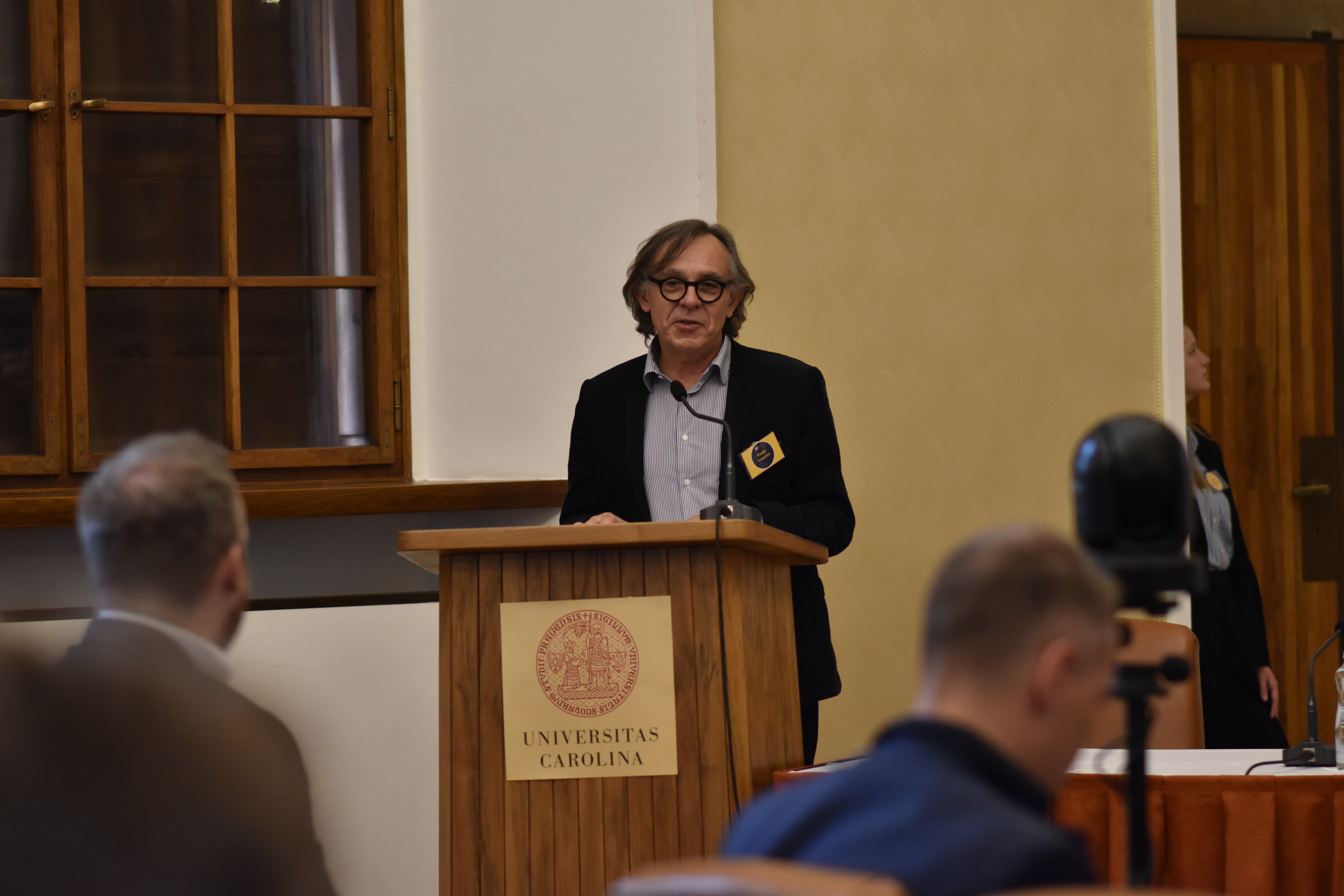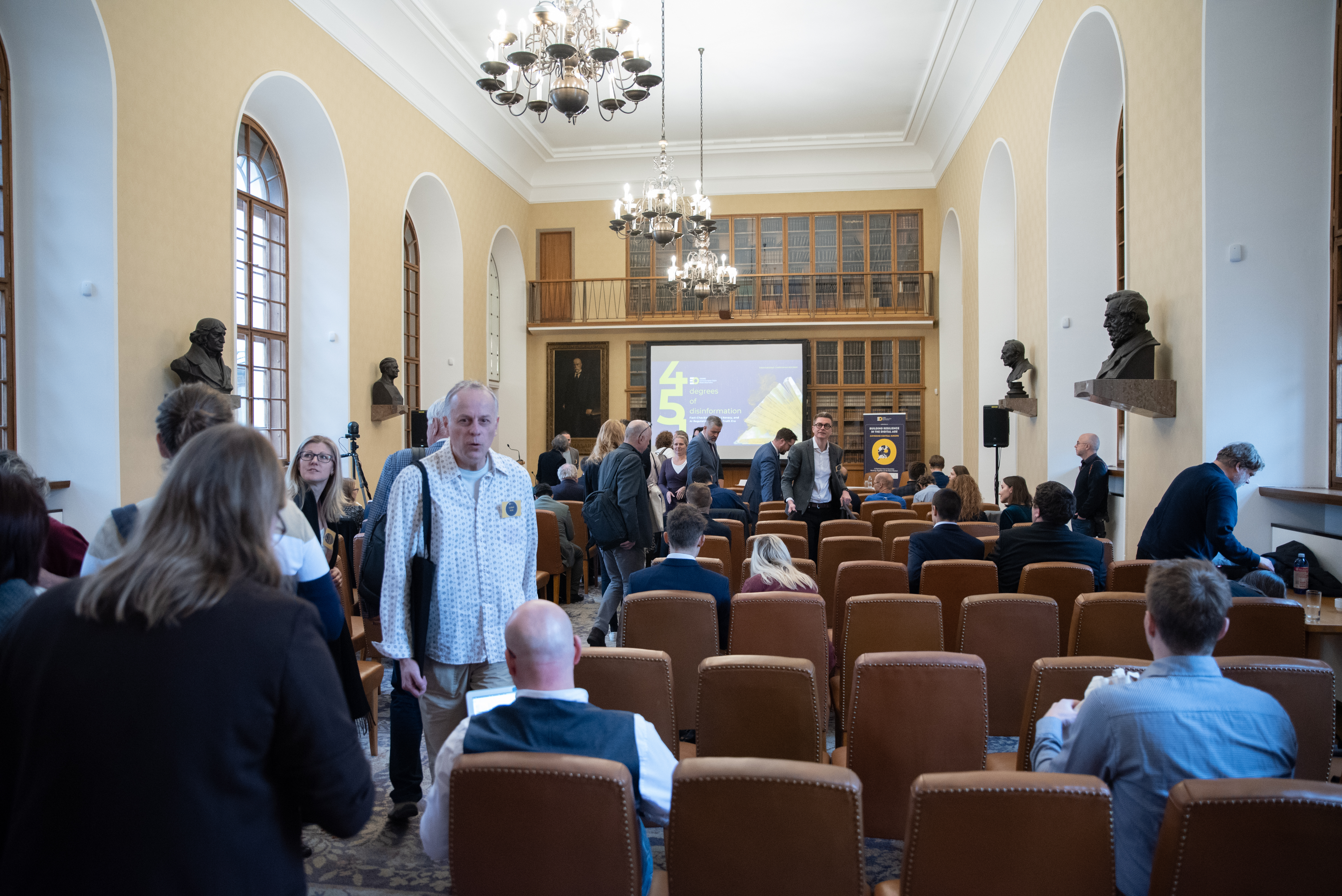
On November 5th, 2024, Charles University became a hub of intellectual exchange as it welcomed over 100 professionals from the fields of media, digital technologies, and regulation to the CEDMO international annual conference. The event was a testament to the university’s commitment to fostering dialogue on critical issues shaping our digital landscape.


The Grand Opening, led by Jana Magdoňová, from Czech Radio, set a formal yet engaging tone for the day. As she introduced the seven keynote speakers, the anticipation in the room was palpable.

The first keynote speaker, Václav Moravec, the lead coordinator of the Central European Digital Media Observatory, warmly welcomed the attendees. He drew attention to the symbolic significance of the venue, the Patriotic Hall, historically the university library, and its connection to this year’s theme inspired by Ray Bradbury’s book “Fahrenheit 451.”

The moderator then welcomed on the stage Věra Jourová, Vice President of the European Commission for Values and Transparency. In her compelling speech, Věra Jourová highlighted the importance of the so-called super election year, using the Moldovan presidential elections as a case study of foreign interference. She detailed the multifaceted nature of the campaign, which included AI-driven disinformation, cyberattacks, and direct voter manipulation. Jourová also underscored the European Commission’s legislative efforts, such as the DSA, Code of Practice, AI Act, the European Media Freedom Act, and praised the proactive measures taken by tech companies to combat harmful AI content. The Vice President concluded by emphasizing the critical role of CEDMO and EDMO in providing solid data on disinformation trends, which she described as invaluable for making informed political decisions.

Following her, Paolo Cesarini, Programme Director of the EDMO network, which consists of 14 hubs operating across the whole of Europe, including CEDMO which covers the Central Europe region, took the stage to discuss the significant achievements of the EDMO network. He highlighted the daily bulletins that tracked disinformation narratives across Europe before the European Parliament elections, noting their predictive power. Paolo Cesarini outlined three future tasks for EDMO: integrating fact-checking, research, and media literacy; transitioning from monitoring to advisory roles; and implementing structural indexes to measure the real impact of disinformation campaigns.

Although unable to attend in person, Silvio Waisbord, a professor at George Washington University, contributed a pre-recorded video message. In his address, Waisbord delved into the complexities of the post-truth era, emphasizing the critical need for robust media literacy and fact-checking mechanisms. He explained that post-truth is characterized by a societal split regarding what constitutes legitimate knowledge and truth, a divide that has deepened in the digital age where facts and evidence are often overshadowed by personal beliefs, narratives, and emotions. Waisbord highlighted the challenges this poses to democracy and scientific consensus, noting that without a shared understanding of reality, it becomes difficult to address global issues such as climate change and public health. He stressed that disinformation thrives in this environment of distrust, exploiting the existing skepticism towards institutions and experts. Addressing the question of whether the post-truth divide can be bridged, Waisbord acknowledged the difficulty of achieving consensus but urged for the exploration of effective tactics such as fact-checking and media literacy. He emphasized the importance of continuing to seek common ground and strategies to counter disinformation and build a shared understanding of reality.

Since our conference coincided with the U.S. presidential elections, the next keynote speaker, Michal Kormaňák, Head of the Public Affairs in IPSOS, presented data indicating that 64% of Republican voters are concerned about election rigging, influenced, for example, by claims frequently made by the Republican presidential candidate, Donald Trump. He also described 2024 as arguably the largest political experiment in human history, with roughly four billion people going to the polls in more than 70 countries. In connection with this, Michal Kormaňák highlighted the global spread of populism, referencing a study conducted in 28 countries. According to the study, two-thirds of people believe that the primary divide in society is between ordinary citizens and the political and economic elite, and they feel that their country needs a strong leader to reclaim it from the rich and powerful, which supports the rise of populism. Additionally, he presented data from research conducted in collaboration with CEDMO, covering the Czech Republic, Slovakia, and Poland, on the reach and trustworthiness of specific disinformation narratives recently circulating in Central European countries. He concluded by emphasizing the need for caution in these times of rising populist movements and the importance of focusing more on addressing and mitigating disinformation.

Péter Krekó, leader of the Hungarian Digital Media Observatory (HDMO), introduced the results of research conducted in collaboration with CEDMO and the Bulgarian-Romanian hub (BROD). He reminded the audience that the original idea for this joint study arose exactly one year ago at the CEDMO Annual Conference. The comparative survey included representative data from Bulgaria, Czechia, Hungary, and Slovakia on conspiracy beliefs, the spread of disinformation, and factual relativism, conducted right before the European Parliament elections in spring 2024. The main question the research aimed to answer was how receptive the population of Central European countries is to disinformation. Péter Krekó also provided insights into EDMO findings, which regularly compile a list of disinformation narratives spread across all European countries. He noted an emerging trend: while disinformation still has regional differences, it is becoming increasingly pan-European, spreading similar narratives throughout the continent. As a Hungarian citizen, he regretted to report that Hungary is the most susceptible to conspiracy mentality and theories compared to the other three countries. Bulgaria represents the “middle ground,” but is quite close to Hungary, while Czechia and Slovakia are more immune.
He also highlighted that Hungary has become highly receptive to Russian disinformation narratives despite the negative history with the Soviet Union and the lack of cultural, language, or religious similarities. According to Péter Krekó, this susceptibility is due to Russia-friendly policies combined with a highly centralized media landscape that spreads disinformation.

The morning part of the conference concluded with a speech by the Rector of Charles University, Milena Králíčková. Madame Rector emphasized that disinformation and the fight for democracy are real and pressing issues. She expressed her pride and honor that the Central European Digital Media Observatory project is based at Charles University and her pleasure in hosting the conference in the Patriotic Hall of Charles University for the third time. She also highlighted the necessity of collaborative efforts among specialists from various faculties, including not only academic staff but also students and non-academics, all united in bringing evidence and science to address the real problems Europe is currently facing. Madame Rector specifically thanked Václav Moravec, the leader of the hub, for being the heart and soul of CEDMO, and his entire team for organizing the event. She expressed hope for the continued support and future success of the project at Charles University.
Afternoon Panels Recap: Insightful Discussions on Digital Transformation and Regulation
On a remarkable afternoon, the high-level conference brought together distinguished professionals from various countries to delve into the pressing issues of our digital era. The event was marked by three compelling panels, each shedding light on different facets of digital transformation, regulation, and media literacy.
Panel 1: Generative AI in the Era of Digital Transformation
The first panel set the stage with an in-depth exploration of generative artificial intelligence (AI) and its profound impact on digital transformation. Moderated by Jakub Šimko from KInIT, the discussion featured insights from Peter Jančárik (Seznam.cz), Lukáš Kutil (CEDMO, Charles University), Ivan Srba (KInIT), and Milan Zubíček (Google).



The speakers examined how generative AI is reshaping the production and dissemination of information, highlighting both the innovative opportunities and the significant challenges it presents. A key focus was the proliferation of disinformation and its implications for public discourse. The panelists emphasized the importance of responsible AI development and deployment, discussing regulatory measures such as the European Union’s AI Act and Digital Services Act. The session provided valuable insights into harnessing AI’s potential while safeguarding the integrity of information in the digital age.
Panel 2: The Implementation of the Digital Services Act: Thoughts and Future Steps
The second panel, moderated by Jana Soukupová from CEDMO, Charles University, delved into the intricacies of implementing the European Union’s Digital Services Act (DSA). Esteemed speakers Stanislav Matějka (EPRA), Andrea Liebman (Swedish Psychological Defence Agency), Kryštof Kučmáš (Czech Telecommunications Office), and Nicola Frank (Lie Detectors) shared their perspectives on this comprehensive regulatory framework



The discussion covered the challenges of enforcing the DSA across different jurisdictions and its expected impact on digital services. The panelists also addressed the responsibilities of digital platforms in monitoring content and combating disinformation. The session illuminated the practicalities of translating regulatory ambitions into tangible outcomes, aiming to create a safer and more transparent online environment.
Panel 3: Media Literacy and Fact-Checking: Practitioners’ Insights
The final panel of the day brought together experts to discuss media literacy and fact-checking as essential tools in the fight against disinformation. Moderated by Jochen Spangenberg from Deutsche Welle, the panel featured Aleksandra Monkos (Demagog Association), Dávid Púchovský (Hoaxy a podvody), Gyula Csák (Bellingcat), Jocelyne Zablit (AFP), and Kati Bremme (France Télévisions).









The speakers shared practical experiences and successful strategies for educating the public and verifying information authenticity. They highlighted the challenges faced by practitioners in an age of rapid information dissemination and emphasized the importance of collaborative efforts and innovative approaches. The panel inspired attendees with effective actions to strengthen societal resilience against misinformation.
Closing remarks
The conference concluded with a sense of optimism and a renewed commitment to addressing the challenges of the digital age. The engaging discussions and diverse perspectives provided attendees with a deeper understanding of the complexities and opportunities in the realm of digital transformation and regulation.
In closing, Nik Hynek, Head of Research at CEDMO, delivered a captivating speech that encapsulated the day’s key points and outlined future steps. His remarks underscored the importance of the discussions held and provided a clear direction for ongoing efforts in the field. His thoughtful conclusions left attendees with a sense of purpose and a roadmap for the future.
This gathering not only highlighted the importance of collaboration and proactive measures in the digital realm but also reinforced the role of academic and professional communities in shaping a resilient and informed society.

Picture: Conference Organizational Team
The photographs were taken by Ema Dvořáková, and the video recording was produced by RTL (Charles University). Some of the pictures used in this article were made as screenshots from the video recording. Enjoy the atmosphere captured in the photographs.

















The conference was made possible thanks to the financial support of Google.
